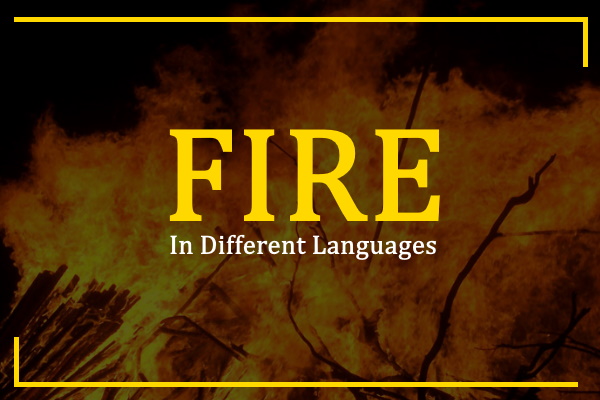Table of Contents
Fire in Different Languages: Fire is extraordinarily beneficial and dangerous at the same time. Within seconds it can turn your belongings into ashes. It has unlimited destructive power as it can reduce an entire forest into a pile of ashes within seconds. Fire kills more people every year than any other natural disaster.
Fire in All Languages
Translation of word Fire in almost 100+ different languages of the world.
| Different Languages | Word Fire |
|---|---|
| Albanian | zjarr |
| Basque | sute |
| Belarusian | агонь |
| Bosnian | vatra |
| Bulgarian | пожар |
| Catalan | foc |
| Croatian | vatra |
| Czech | oheň |
| Danish | brand |
| Dutch | brand |
| Estonian | tulekahju |
| Finnish | antaa potkut |
| French | Feu |
| Galician | lume |
| German | Feuer |
| Greek | Φωτιά (Fotiá) |
| Hungarian | Tűz |
| Icelandic | Eldur |
| Irish | tine |
| Italian | fuoco |
| Latvian | uguns |
| Lithuanian | gaisras |
| Macedonian | оган |
| Maltese | nar |
| Norwegian | Brann |
| Polish | ogień |
| Portuguese | fogo |
| Romanian | foc |
| Russian | Огонь (Ogon') |
| Serbian | пожар (pozhar) |
| Slovak | oheň |
| Slovenian | požar |
| Spanish | fuego |
| Swedish | brand |
| Ukrainian | вогонь (vohon') |
| Welsh | tân |
| Yiddish | פייַער |
| Armenian | կրակ |
| Azerbaijani | yanğın |
| Bengali | আগুন |
| Chinese Simplified | 火 (huǒ) |
| Chinese Traditional | 火 (huǒ) |
| Georgian | ცეცხლი |
| Gujarati | આગ |
| Hindi | आग |
| Hmong | hluav taws kub |
| Japanese | 火災 |
| Kannada | ಬೆಂಕಿ |
| Kazakh | от |
| Khmer | ភ្លើង |
| Korean | 불 (bul) |
| Lao | ໄຟ |
| Malayalam | തീ |
| Marathi | आग |
| Mongolian | гал |
| Myanmar (Burmese) | မီး |
| Nepali | आगो |
| Sinhala | ගිනි |
| Tajik | оташ |
| Tamil | தீ |
| Telugu | ఫైర్ |
| Thai | ไฟ |
| Turkish | ateş |
| Urdu | آگ |
| Uzbek | yong'in |
| Vietnamese | ngọn lửa |
| Arabic | نار (nar) |
| Hebrew | אֵשׁ |
| Persian | آتش |
| Afrikaans | vuur |
| Chichewa | moto |
| Hausa | wuta |
| Igbo | ọkụ |
| Sesotho | mollo |
| Somali | dabka |
| Swahili | moto |
| Yoruba | ina |
| Zulu | umlilo |
| Cebuano | kalayo |
| Filipino | apoy |
| Indonesian | api |
| Javanese | geni |
| Malagasy | afo |
| Malay | api |
| Maori | ahi |
| Esperanto | fajro |
| Haitian Creole | dife |
| Latin | ignis |
Fire in European Languages
Translation of word Fire in almost 42 European languages.
| Different Languages | Word Fire |
|---|---|
| Albanian | zjarr |
| Basque | sute |
| Belarusian | агонь |
| Bosnian | vatra |
| Bulgarian | пожар |
| Catalan | foc |
| Corsican | focu |
| Croatian | vatra |
| Czech | oheň |
| Danish | brand |
| Dutch | vuur [] |
| Estonian | tulekahju |
| Finnish | tuli [too-ly] |
| French | Feu |
| Frisian | fjoer |
| Galician | lume |
| German | Feuer |
| Greek | Φωτιά [Fotiá] |
| Hungarian | Tűz |
| Icelandic | Eldur |
| Irish | tine |
| Italian | fuoco |
| Latvian | uguns |
| Lithuanian | gaisras |
| Luxembourgish | Feier |
| Macedonian | оган |
| Maltese | nar |
| Norwegian | Brann |
| Polish | ogień |
| Portuguese | fogo |
| Romanian | foc |
| Russian | Огонь [Ogon'] |
| Scots Gaelic | teine |
| Serbian | пожар [pozhar] |
| Slovak | oheň |
| Slovenian | požar |
| Spanish | fuego |
| Swedish | brand |
| Tatar | ут |
| Ukrainian | вогонь [vohon'] |
| Welsh | tân |
| Yiddish | פייַער |
Fire in Asian Languages
Translation of word Fire in almost 36 Asian languages.
| Different Languages | Word Fire |
|---|---|
| Armenian | կրակ |
| Azerbaijani | yanğın |
| Bengali | আগুন |
| Chinese Simplified | 火 [huǒ] |
| Chinese Traditional | 火 [huǒ] |
| Georgian | ცეცხლი |
| Gujarati | આગ |
| Hindi | आग |
| Hmong | hluav taws kub |
| Japanese | 火災 |
| Kannada | ಬೆಂಕಿ |
| Kazakh | от |
| Khmer | ភ្លើង |
| Korean | 불 [bul] |
| Kyrgyz | от |
| Lao | ໄຟ |
| Malayalam | തീ |
| Marathi | आग |
| Mongolian | гал |
| Myanmar (Burmese) | မီး |
| Nepali | आगो |
| Odia | ଅଗ୍ନି |
| Pashto | اور |
| Punjabi | ਅੱਗ |
| Sindhi | باھ |
| Sinhala | ගිනි |
| Tajik | оташ |
| Tamil | தீ |
| Telugu | ఫైర్ |
| Thai | ไฟ |
| Turkish | ateş |
| Turkmen | ot |
| Urdu | آگ |
| Uyghur | ئوت |
| Uzbek | yong'in |
| Vietnamese | ngọn lửa |
Fire in Middle East Languages
Translation of word Fire in 4 middle eastern languages.
| Different Languages | Word Fire |
|---|---|
| Arabic | نار [nar] |
| Hebrew | אֵשׁ |
| Kurdish (Kurmanji) | agir |
| Persian | آتش |
Fire in African Languages
Translation of word Fire in almost 13 African languages.
| Different Languages | Word Fire |
|---|---|
| Afrikaans | vuur |
| Amharic | እሳት |
| Chichewa | moto |
| Hausa | wuta |
| Igbo | ọkụ |
| Kinyarwanda | umuriro |
| Sesotho | mollo |
| Shona | moto |
| Somali | dabka |
| Swahili | moto |
| Xhosa | umlilo |
| Yoruba | ina |
| Zulu | umlilo |
Fire in Austronesian Languages
Translation of word Fire in almost 10 Austronesian languages.
| Different Languages | Word Fire |
|---|---|
| Cebuano | sa kalayo |
| Filipino | apoy |
| Hawaiian | ahi |
| Indonesian | api |
| Javanese | geni |
| Malagasy | afo |
| Malay | api |
| Maori | ahi |
| Samoan | afi |
| Sundanese | seuneu |
Fire in Other Foreign Languages
| Different Languages | Word Fire |
|---|---|
| Esperanto | fajro |
| Haitian Creole | dife |
| Latin | ignis |
Video Translation of Fire in 10 Other Languages
Coming Soon…
More Information about Fire
Fire is also very helpful. It was the first form of light produced by man. The fire also gave us the ability to cook and survive in very cold environments. It is one of the most important forces in human history. But what is fire actually made of?
Combustion is a process that produces fire. Flames are created at some stage in combustion known as ignition point. Flames consist of carbon dioxide, water vapours, oxygen and nitrogen.
Read Also:
Fire emits heat and light because it is an exothermic reaction; a reaction that releases energy as fire and heat. They require an input of energy and produce products.
Everyday Americans are more likely to experience the horrifying effects of fire. Each year, more than 4,000 Americans die and approximately 20,000 are injured in fires. Many forests were burnt down due to uncontrolled fires.
The latest example we see is from the Amazon forest in Brazil in which total destroyed area was 906,000 hectares. It has contributed to deforestation of this large forest.
Many species were being burnt. It is estimated that almost 2 million wild animals died in this wildfire. Wild cats like jaguars including many others are known to die. Many rodents have also being killed.
Fire is also beneficial for cooking. Can you cope with the smelly meat until its well cooked? No, of course not. The fire we use every day in our home comes through gas pipelines.
These pipelines transfer gas from its extraction areas for domestic use. We produce fire to stay warm in cold season. It is beneficial as well as harmful in some cases. It is better to stay safe while working with fire.
Fire is a universal phenomenon, how about learning to speak fire in different languages.

Arslan Hussain, founder of The Different Languages, is an experienced translator passionate about languages and cultures. Through his website, he shares his knowledge and love for different languages, making learning accessible and enjoyable.

